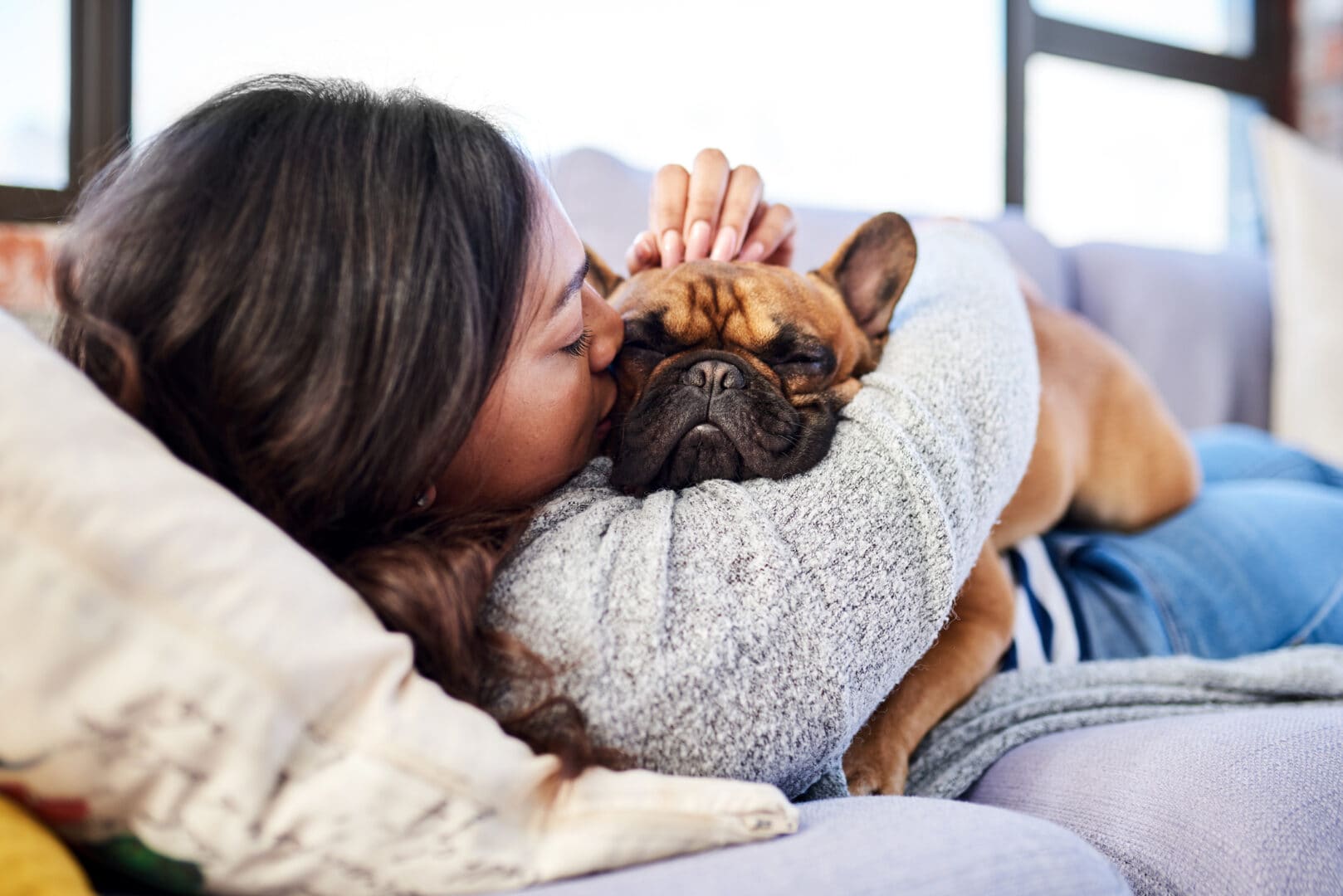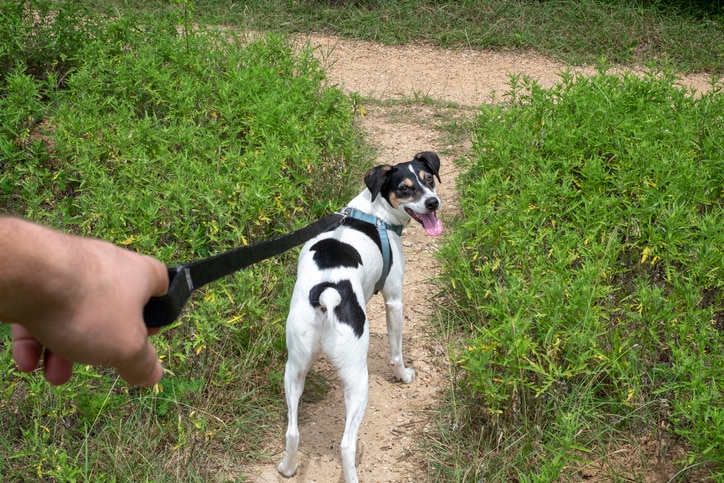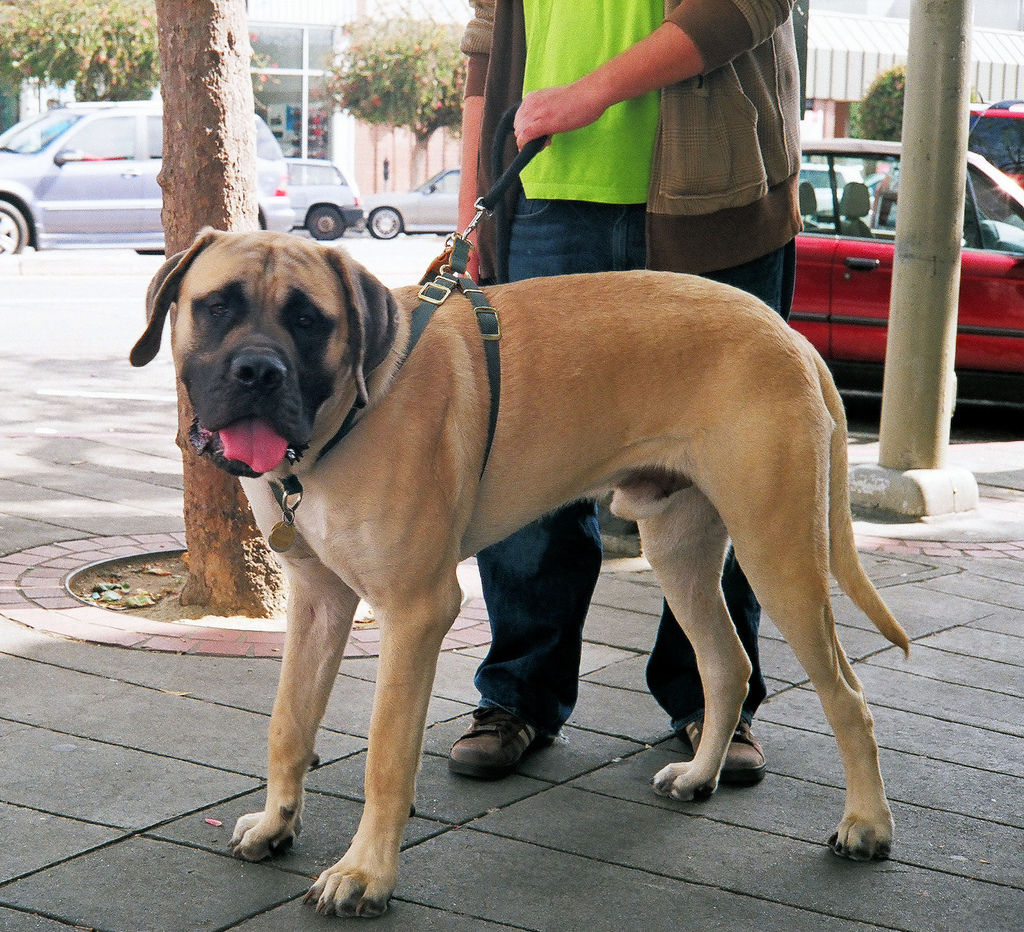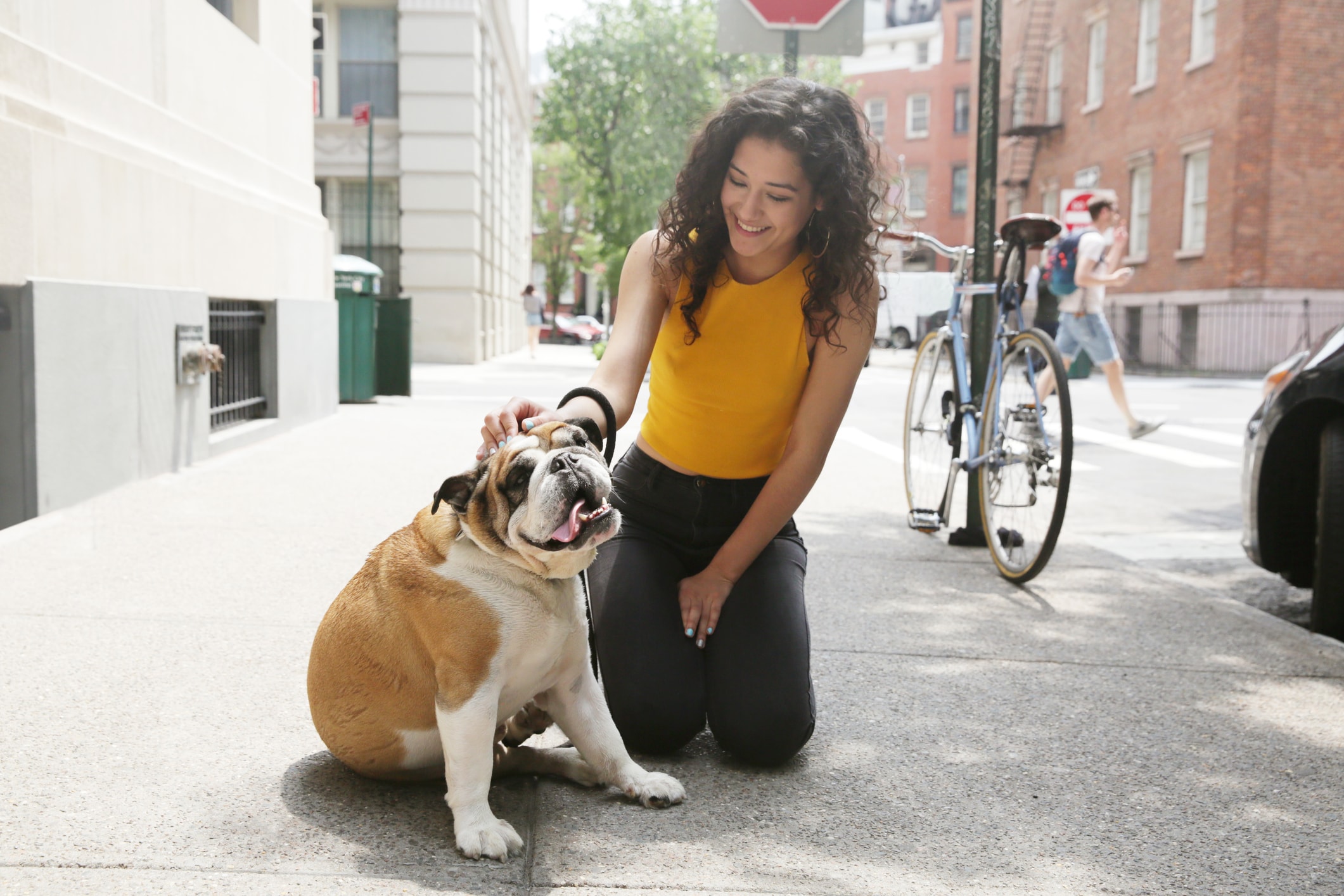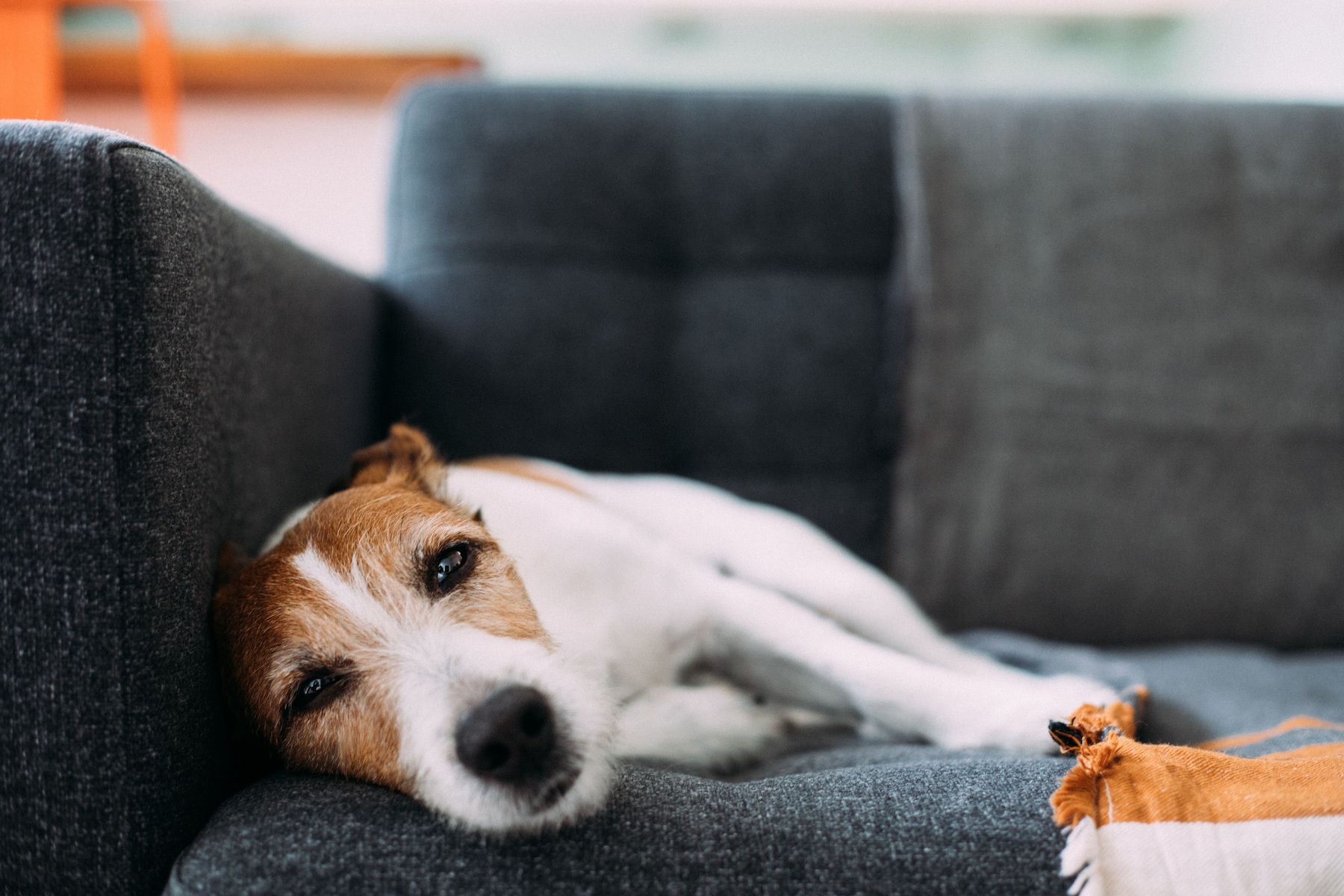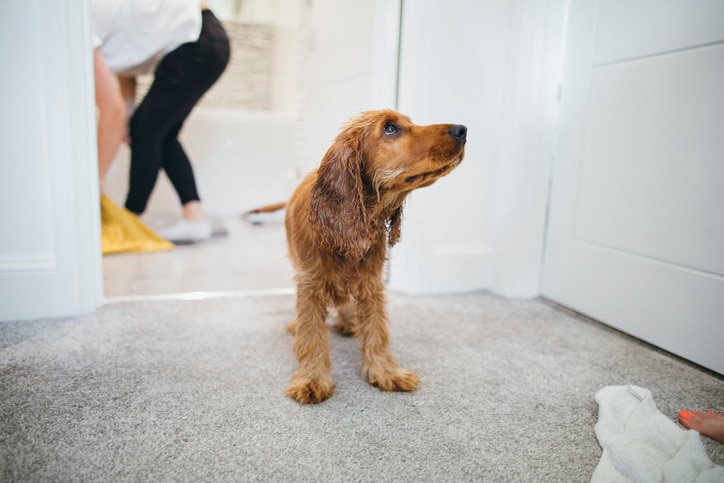In this article
- Can dogs get COVID?
- Can dogs get COVID from humans?
- Should I avoid contact with my pets if I have COVID-19?
- Do dogs show symptoms if infected with COVID-19?
- What are common dog COVID symptoms?
- Should I get my dog tested for COVID?
- Can I get COVID from my dog?
- What are the health risks if my dog gets COVID?
- Can I get my dog a COVID-19 vaccine?
- A final thought on dogs and COVID
Your dog is part of the family, so of course you want to keep them as healthy as possible at all times. While you cover all the care basics — vaccinations, vet trips, plenty of food, water and snuggles — you may want to know if your dog can get COVID (from you or anyone else!), and if so, how serious it is and what to do.
Whether you’ve been infected with the virus that causes COVID-19 and are wondering if you should steer clear of your pet or just want to be proactive, here’s what the experts have to say about dogs and whether or not they can catch COVID.
Key takeaways
- Yes, dogs can get COVID, but there are fewer cases in pets than humans and symptoms tend to be more mild.
- Most of the dogs who have caught COVID-19 were associated with close contact with infected humans; however, it’s still unlikely that your dog will catch COVID from you.
- Common COVID symptoms in dogs include sneezing, lethargy, coughing and nasal discharge. It’s important to see a vet if your pet is in respiratory distress.
- You can protects dogs from COVID by practicing good hygiene, avoiding crowded spaces like dog parks during peak illness times and isolating your dog from other sick pets.
Can dogs get COVID?
The short answer is yes, dogs can get COVID. However, even though it is possible for a dog to catch COVID, infections in dogs and other animals are still uncommon. There have only been 180 COVID cases reported in dogs worldwide, according to researchers at the Complexity Science Hub Vienna.
The Austrian researchers teamed up with the Wildlife Conservation society to publish the first COVID data tracking dashboard for cases in animals, and it’s updated regularly. As of their latest figures, 42 different animal species, including cats, minks, hamsters and other pets, have been impacted by COVID.
But if you put the number of cases where COVID infection has been confirmed in animals — 6,091 since 2022 — up against the millions of cases of humans infected with COVID-19, the chances of your dog coming down with the disease is very rare, according to the experts.
Read more:
Can dogs get COVID from humans?
Most of the dogs who have caught COVID-19 were associated with close contact with infected humans, says New York City veterinarian Dr. Robert Gonzalez, regional medical director for Small Door Veterinary.
With human contact to blame for most cases of the family dog catching COVID, does that mean your pooch will catch it from you if you’ve tested positive? The risk of your family dog catching COVID from you remains low, according to Gonzalez. “Human-to-dog transmission is possible but very rare,” he notes.
The transfer of illnesses between animals and humans is not uncommon. The CDC estimates that 6 out of every 10 infectious diseases that make humans sick are what’s known as zoonotic diseases — essentially nasty germs that are spread by animals to humans. COVID-19 has been labeled a zoonotic disease by the World Health Organization, and there are reports of domestic pets passing the disease to humans.
It works the other way too — reverse zoonosis disease transmission is the process of a human transmitting a disease to an animal, such as in the cases of dogs getting sick from their owners. And while COVID-19 transmission from humans to their pets is rare, it’s still recommended that you avoid contact to prevent it from happening.
Should I avoid contact with my pets if I have COVID-19?
If you’ve been instructed to isolate yourself from other humans due to a positive COVID test, the same should apply to your pets, Northern California vet Dr. Sabrina Kong advises. Leave pet care to a family member or a dog walker who is healthy and won’t put your dog at risk.
Of course it’s not always possible to completely isolate yourself from your dog — especially if you live alone and your pup still depends on you for the basics like food and water — but at the very least, it’s best to cut out snuggles and sleep separately from your dog while you recuperate, as well as wear a mask when you do have to interact.
Find a pet sitter.
Do dogs show symptoms if infected with COVID-19?
If your dog does catch COVID, you may not know it at all. That’s because most experience mild or no symptoms at all, Gonzalez says.
In fact, 42% of dogs whose infections were tracked by the Austrian researchers — the largest subset of the 180 total sick dogs around the world — were labeled “subclinical,” meaning they either had no symptoms or their symptoms could not be definitively linked to COVID.
“Severe illness in dogs due to COVID-19 is extremely rare, and the overall prognosis for dogs with COVID-19 is generally very good.”
—Dr. Robert Gonzalez, veterinarian
What are common dog COVID symptoms?
If your dog does get sick and is one of the pets that shows symptoms, they may show any or all of the following signs:
- Coughing.
- Sneezing.
- Nasal discharge.
- Lethargy.
- Mild respiratory distress.
If your dog has been exposed to COVID and is showing any of these signs, it’s important to call your veterinarian and follow their advice.
“Infected pets should be cared for while taking precautions to prevent transmission to humans and other animals,“ Gonzalez advises.
If you’re under quarantine because of a COVID-19 diagnosis or exposure, it’s important that you do not take your dog to the vet yourself — ask a friend or hire a pet sitter or dog walker who can safely transport your pup to get care.
Should I get my dog tested for COVID?
Although there are coronavirus tests for animals, the United States Department of Agriculture does not suggest routine testing of dogs simply because they’ve been in contact with someone who has COVID-19.
But if your dog is showing symptoms that require a vet visit, your vet will decide if a coronavirus test is in order or not.
Can I get COVID from my dog?
OK, so we said COVID-19 is zoonotic, which means it can be transmitted from an animal to a human. And we’ve acknowledged that it is possible that your dog could get COVID. Does that mean your dog could actually be the one giving you COVID?
While there have been documented cases of human-to-pet and potential pet-to-pet transmission, the risk of you catching the virus from Fido is very low, Gonzalez says.
If by chance your dog does get a COVID diagnosis, you should still follow precautions to reduce the risk of transmission to both you and other pets:
- Isolate your dog from other pets.
- Follow the same social distancing rules that apply to people in the home (as much as possible — we all know dogs don’t exactly understand space!).
- Avoid dog parks, dog kennels and mixing your dog with other animals and humans.
- Practice good hygiene — wash your hands well before and after petting your dog, feeding them, etc.
- Wear personal protective equipment (PPE) when interacting with a sick dog.
- Consult your veterinarian for guidance on providing care and monitoring.
Just as you would if you were sick with COVID-19 yourself, you’ll also have to simply steer clear of your pooch, says Dr. Linda Simon, a veterinarian with Five Barks. “As hard as it will be, limit contact and avoid cuddles or kisses during this time,” she advises.
Treatment comes down to supportive care… keeping a dog warm and comfortable and encouraging rest while providing tempting food to help keep their appetite up as well as plenty of fluids.
—Dr. Linda Simon, veterinarian
What are the health risks if my dog gets COVID?
Because COVID-19 is a virus, there is no cure — not even in dogs.
Treatment comes down to supportive care, Simon explains, keeping a dog warm and comfortable and encouraging rest while providing tempting food to help keep their appetite up as well as plenty of fluids. She suggests offering a teaspoon of honey every four to six hours to soothe the dog’s throat if they have a harsh cough, and your vet may prescribe anti-inflammatories or other pain relief to help make your dog more comfortable.
The biggest risk for a dog with COVID-19 is a secondary infection — such as a bacterial infection that may turn into pneumonia and require antibiotics and more serious treatment.
The good news? Dogs have a very high rate of recovery from COVID.
“In most cases, they recover without significant complications, similar to humans with mild cases,” Gonzalez notes. “Severe illness in dogs due to COVID-19 is extremely rare, and the overall prognosis for dogs with COVID-19 is generally very good.”
Can I get my dog a COVID-19 vaccine?
There are plenty of vaccines out there that can help keep our dogs safe from serious diseases from Lyme to rabies, but right now there’s no COVID-19 vaccine for dogs — just humans.
Your vet may suggest your dog receive either the Enteric Canine Coronavirus (CCoV) or the Respiratory Canine Coronavirus (CRCoV) vaccines. These canine coronavirus vaccines help prevent a contagious intestinal virus that can cause a variety of nasty symptoms such as nausea, vomiting and diarrhea. Unfortunately, neither of the vaccines can prevent SARS-CoV-2, the virus that causes COVID-19.
A final thought on dogs and COVID
Dogs aren’t immune to COVID, but pet owners don’t need to lose sleep worrying that their furry friend may be harmed by the virus. In general, pets are much less likely than humans to catch COVID, and they’re also less likely to experience severe symptoms of they do get sick.
With that in mind, the experts say the best prevention is to simply keep dogs away from unvaccinated people and those who are actively showing COVID-19 symptoms. If you are sick yourself, working with a qualified dog walker or pet sitter can help you avoid putting your pet at risk.
Lastly, if your dog is exposed to COVID or is showing symptoms of being ill, check in with a veterinarian. They can answer your questions and give you personalized advice to keep your pup healthy and safe.
